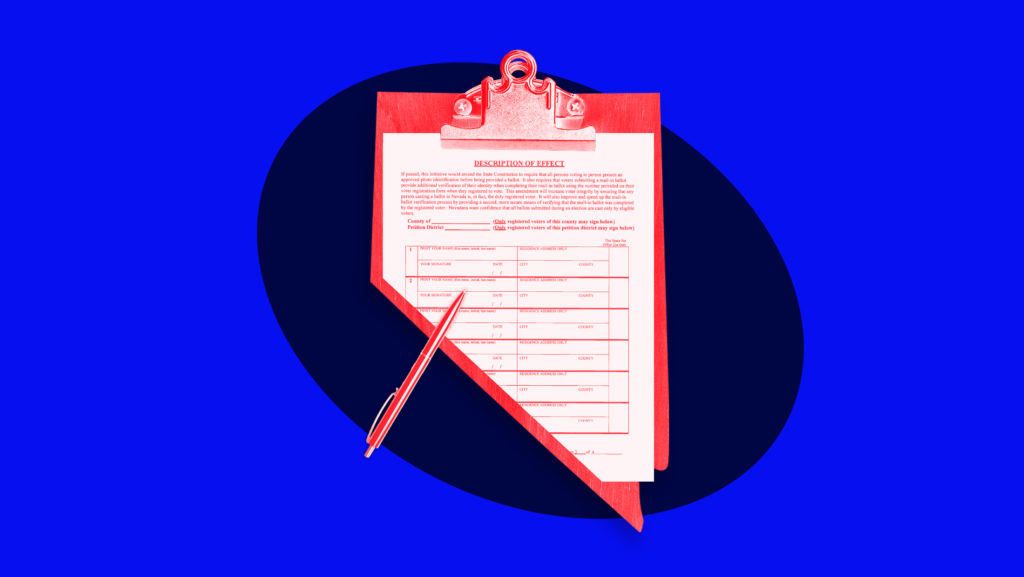A Tale of Two Ballot Initiatives

In 2021, Nevada Democrats wielded their legislative power to make voting easier, notably establishing permanent mail-in voting in the state. Now, a right-wing group is determined to undermine that result.
A Republican-led PAC called “Repair the Vote” has proposed two ballot measures that would severely restrict voting in the state — evading Nevada’s Democratic-controlled institutions by placing the policies in front of voters instead. Two lawsuits have been filed to end these measures.
Ballot initiatives are another tool in the GOP’s arsenal of voter suppression tactics, but they can sometimes fly under the radar. Keep reading for the full story of what’s going on in the Silver State and what voters may or may not see on their ballots this November.
What is a ballot initiative?
Ballot initiatives, sometimes known as ballot measures, voter initiatives or propositions, allow voters to vote directly on policy. Proponents of a ballot initiative must gather a certain number of signatures for the question to be placed in front of voters (or in some cases, the state legislature). For more on how this process varies in the 26 states that permit citizen-led initiatives, read “The Petition Process and Ballot Initiatives Explained.”
In Nevada, the number of signatures required to get a measure on the ballot is 10% of the total votes cast in the preceding general election. In 2022, that means the threshold of valid signatures is 140,777, distributed evenly throughout all four congressional districts.
For constitutional amendments or legislative referendums, a qualified initiative will go directly on the ballot (and amendments must be approved in two consecutive elections). In the case of initiatives seeking to change Nevada law, the proposal is presented to the Nevada Legislature and will only go on the ballot in the next general election if the Legislature fails to act on it.
What ballot measures to restrict voting are circulating in Nevada?
Republicans are trying to circumvent the Democratic-controlled Legislature and governorship with two petition initiatives that would alter voting laws. The first measure is a constitutional amendment and the second is a referendum on a law passed in 2021.
The first proposal seeks to add a voter identification requirement for both in-person and mail-in voting. At the polls, voters would have to show an acceptable form of photo ID. For mail-in ballots, voters must provide the last four digits of their driver’s license number (and if they do not have a license, the last four digits of their Social Security number). The proposal does not provide free identification cards for those who do not have them, nor create a plan for raising revenue or training for election officials.
The second ballot measure is a referendum that seeks to repeal three provisions of Assembly Bill 321, a voting law passed in 2021. The initiative wants to overturn the provisions that send all registered voters a mail-in ballot, permit community ballot collection and accept mail-in ballots missing a postmark that are received up to three days after Election Day.
Ballot initiatives are a form of direct democracy. But misleading descriptions cover up the nefarious impact of voter suppression.
While Repair the Vote continues to gather signatures in advance of June deadlines, two lawsuits were filed in state court on Feb. 18 that seek to end both ballot measures. The lawsuits argue that the descriptions do not accurately reflect the true intent and goal of the measures in violation of Nevada law. The “description of effect” is a short summary of a ballot measure that is included on the form to gather signatures.
The first lawsuit challenges the voter ID initiative, which is characterized as promoting “voter integrity.” To counter this purported motive, the complaint cites statistics from 2020 where only 25 of the 1.3 million ballots cast in the state were flagged for further review with only one conviction. In contrast, the complaint names recent problems arising from a similar voter ID law in Texas. In light of these facts, the main argument in the lawsuit hinges on the description of the effect being “legally deficient because it is argumentative, confusing, deceptive, and misleading.”
Additionally, the lawsuit challenges the voter ID initiative for violating Article 19, Section 6 of the Nevada Constitution, which prohibits initiatives from requiring expenditures without including the means to raise the necessary revenue. The complaint argues that, if approved, the voter ID initiative would require the state to spend significant money on updating voter registration materials and outreach without a plan to fund these expenses.
The second lawsuit makes a similar claim — that the language to describe the effect of the mail-in voting initiative is misleading and legally impermissible. According to the complaint, there are a few reasons, including:
- The initiative description misstates the law it seeks to repeal. The description says that A.B. 321 “require[s] that each active registered voter automatically receive a mail ballot” — which is not the case, as A.B. 321 creates an opt-out system.
- The description uses “ballot harvesting,” which the lawsuit argues is a pejorative term that is never used in A.B. 321 nor defined within the petition.
- The description misrepresents the current mail-in ballot deadline by implying that the state accepts mail-in ballots missing postmarks indefinitely. In reality, these ballots are treated as timely when received by 5 p.m. on the third day following an election.
Both lawsuits ask the court to prohibit the initiatives from being placed on the 2022 ballot. Between the new voter ID rules and repealing popular mail-in voting procedures, the ballot initiatives would have widespread impacts on voters — but the Republican PAC is concealing the negative impact.
We will continue to follow the developments in Nevada. In the meantime, keep an eye on ballot initiatives that may be moving in your state, as more GOP groups embrace this tool as a way to enact voting restrictions. In 2022, democracy will be on the ballot in more than one way.